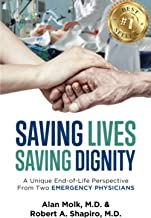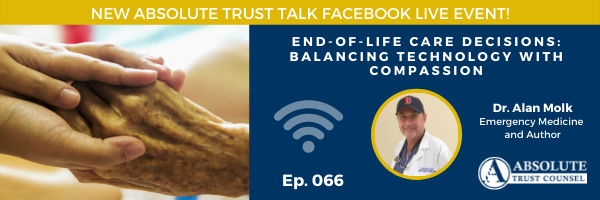Let’s face it. No one wants to discuss end-of-life care decisions. And with modern medicine and medical technology, we have become very accustomed to doing everything possible to prolong life. But often, that can involve aggressive and invasive treatment.
For many seniors, decisions about medical care will fall to family members due to incapacity, and these types of decisions can be challenging to make. In our experience, people want to be surrounded by loved ones in a comfortable environment, but it’s hard for family members to see past all the options, outcomes, and considerations.
In a new Absolute Trust Talk Live episode, Kirsten sits down with emergency physician Dr. Alan Molk. Harnessing his medical background and experience as a decision-maker for his mother during her journey with Alzheimer’s, Dr. Molk offers valuable insights into how to have the right conversations with loved ones to balance end-of-life decision-making with comfort, dignity, and respect.
Big Three from Episode #066:
- Have end-of-life decision-making conversations as early as possible with your families, doctors, attorneys, spiritual advisors–all-important parties involved.
- End-of-life decision-making is about what the patient truly wants.
- Hospice and palliative care are not “death panels.” In fact, they have been shown to provide a better quality of life for the patient and family members.
Time-stamped Show Notes:
4:58 – Dr. Molk dives into his experience caring for his mother with Alzheimer’s and how he decided to write his book, Saving Lives, Saving Dignity.
8:26 – Dr. Molk shares what it was like to make decisions for his mother and how his background as a physician came into play.
11:08 – This is an example of how common it is not to know a person’s true end of life wishes are.
13:50 – In emergency rooms, the job is to keep a patient alive, but it’s also essential to consider this perspective too.
17:20 – Kirsten and Dr. Mold discuss some of the considerations we should consider in decision-making and end-of-life care.
22:20 – If there was ever an event that made everyone realize the importance of end-of-life conversations that need to be had among families, it was COVID.
26:04 – Do you find that most families are open to considering palliative care rather than the full-court press medical care at the end of life?
27:52 – In your experience, are hospice and palliative care decisions more likely made when patients can still speak for themselves? Or when the family member is making a choice?
Get Your Copy of Saving Lives, Saving Dignity:
While it’s true that modern medicine allows us to prolong life, it may not be the best option or even what a patient wants for their end-of-life care. Today’s guest, Dr. Alan Molk, and colleague Dr. Robert Shapiro have authored a valuable book that helps families have critical end-of-life conversations with loved ones and physicians to make smart comforting decisions for everyone involved. Here’s a link to purchase your copy today > Amazon!

[Ad] Planning for the future is vital to ensure that you and your family are protected and prepared throughout your later years of life and beyond. Please don’t wait until it’s too late. Schedule a free discovery call today, and we’ll review your case to make sure all your needs are met.
Looking for more resources? Absolute Trust Counsel has a library of free articles, checklists, and guidebooks to address the most common estate planning questions in easy-to-understand language. Explore those listed below, or for more, visit https://absolutetrustcounsel.com/resources.





